“if you squint your brain, I’ll get my paints”
Artist: They Might Be Giants
Album: Join Us
This was planned as my review of my favorite album of 2011, They Might Be Giants’ Join Us, an album whose greatness surprised me, perhaps more than it should have. But in practice it’s my history, analysis, and celebration of the band in general. Join Us was their 14th studio album, so 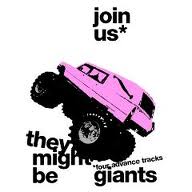 instead of writing lots of little reviews, I’m writing this one which will take its time approaching the present. I’ll try to make it painless: by the time I even mention again the album in question, I’ll already have made most of the points about it that I wanted to.
instead of writing lots of little reviews, I’m writing this one which will take its time approaching the present. I’ll try to make it painless: by the time I even mention again the album in question, I’ll already have made most of the points about it that I wanted to.
I’m guessing most Pop Rock Nation readers have at least a beginning familiarity with They Might Be Giants, but here’s a quick primer for any who don’t: go watch the highly imaginative videos for their 1986-1990 hit songs Don’t Let’s Start, Ana Ng, and Birdhouse in Your Soul. You might not immediately get what’s wonderful — my teenage self, to my discredit, was interested but kept a nervous distance. But you’ll notice at least their most obvious traits: their cheerfulness, their brevity, their winding melodies, their nasal singing, their incorporation of rock organ and occasional trombone, the ways they make 4/4 time blaring and disruptive.
I should probably have tossed in non-hits Istanbul (Not Constantinople) and Particle Man, which became signature songs via exposure in TV cartoon shows, and make their uncoolness that much more obvious: barbershop quartet vocal harmonies, gypsy violin, accordion, polka. But that’s okay; it’s not like you were going to get “cool” from John Linnell peppily singing “No one in this world ever gets what they want, and that is beautiful/ Everybody dies frustrated and insane, and that is beautiful/ They want what they’re not, and I wish they would stop saying/ ‘Deputy dog dog a ding dang depa depa'”. Or describing an across-the-world separation from a soulmate as “Make a hole with a gun perpendicular/ to the name of this town on a desktop globe./ Exit wound in a foreign nation/ showing the home of the one this is written for”. Or singing a song from the perspective of a nightlight.
As I already suggested, they were a commercially successful duo: second album Lincoln was the best-selling independent label album in U.S. history at the time (around 700,000 copies, a record later demolished by Green Day and the Offspring), and third album / major-label debut Flood reached the 1,000,000-sales mark. They were, in fact, pioneers of what has been known as “geek-pop”, precedent for Cake and Moxy Fruvous and the Ben Folds Five and those that came later. Not because nerds had never gotten on radio and MTV before — Yes? Jethro Tull? Pink Floyd? Rush? — but because with the gimmicky exception of Weird Al Yankovic, they had never done so by being approachable, relatable, and out to entertain. Yes never sang about everyday things like “Memo to myself: Do the dumb things I gotta do”. 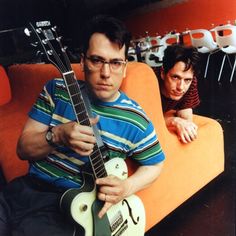 Or “I could never sleep my way to the top/ cuz the alarm clock always wakes me right up”. Or “Where your eyes don’t go, a filthy scarecrow waves its broomstick arms, and does a parody of each unconscious thing you do”. Genesis had the Bible in their name; I doubt God’s secretary ever told them “He’s on another line, can [you] hold for a really long time?”. Jethro Tull concerts sound like they were pretty amazing spectacles back in the day, and I’d love to have gone to one, but I don’t think they ever got their audience members into a conga line like They Might Be Giants did.
Or “I could never sleep my way to the top/ cuz the alarm clock always wakes me right up”. Or “Where your eyes don’t go, a filthy scarecrow waves its broomstick arms, and does a parody of each unconscious thing you do”. Genesis had the Bible in their name; I doubt God’s secretary ever told them “He’s on another line, can [you] hold for a really long time?”. Jethro Tull concerts sound like they were pretty amazing spectacles back in the day, and I’d love to have gone to one, but I don’t think they ever got their audience members into a conga line like They Might Be Giants did.
But as important as TMBG may have been, those sales records still show that most Americans were not, in the end, exposed to American history lessons like “I remember the year I went to camp/ I heard about a lady named Selma and some blacks./ Somebody stuck a finger in the President’s ear/ it wasn’t too much later they came out with Johnson’s Wax”. Or to They’ll Need a Crane, where sentiments like “Don’t call me at work again/ No, no, the boss still hates me/ I’m just tired and I don’t love you anymore/ and there’s a restaurant we should check out/ where the other nightmare people go” are surrounded before and after by a fast, bouncy pace.
********
In 1992, They Might Be Giants‘s chief backer at the Elektra record label was fired, and they lost most of their promotion budget, which means that a lot of people who do know their early work lost the story after that. Other fans left the band behind more intentionally: that was the year TMBG first presented themselves as a real, 5-piece rock band on Apollo 18, which they’ve remained ever since. To me the effects of their becoming a band are often over-stated: from then till now, they’ve never stopped doing cheapo barbershop quartet songs (Turn Around; John Flansburgh’s basso-profundo O Do Not Forsake Me; the goofy strings-accented Exquisite Dead Guy with its unexpectedly lovely harp interval; the voice-and-tuba I Can Hear You recorded on one of Thomas Edison’s original wax cylinders). Nor did they give up on surprises like tiny Renaissance chamber arrangements (Older), or playful detours into low-budget hip-hop (the exaggeratedly Boston-accented Wicked Little Critta). The bandmates have often been used in service of whimsy: the minute-plus of fake endings that conclude Spy, the assemblage of 18 tiny unrelated song fragments that is Fingertips.
But since the band is genuinely talented, it also has granted Linnell and Flansburgh the freedom to stretch out into playful funk-rock (Snail Shell, S-E-X-X-Y, the parts of the Guitar that aren’t goofy tributes to the Lion Sleeps Tonight). Or high-speed punk-ska and punk-polka (Stomp Box, Dig My Grave). Or perfectly credible synth-pop (the sonically inventive Metal Detector, the Pet Shop Boys impression Man It’s So Loud in Here). Beyond that, the band allowed the songwriting duo more layered, complex, muscular arrangements of their usual bouncy nerd-pop: I won’t say that Spiraling Shape or Bells are Ringing sound like ’90s alt-pop radio, because there’s too many touches (especially the vocals) that don’t fit, but the guitarist and bassist and drummer show moves that could easily have anchored hits. Good hits. They Might Be Giants gave up their uniqueness, the naysayers of their band phase explain. They allowed themselves to deploy uniqueness *on purpose* rather than being limited to it by need, I’d counter.
The band’s lyrical changes over time also moved in the direction of normality, for better and for worse. This can, again, be overstated, especially on Apollo 18 and 1994’s John Henry (my absolute favorite TMBG album), where 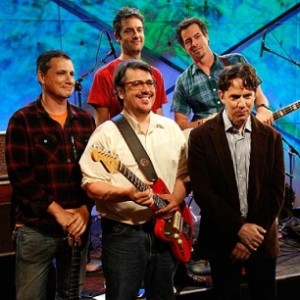 the band continued to reel off goofs like “Someday my mother will die and I’ll get the money/ Mom leans down and says ‘My sentiments exactly, you son of a bitch”. Not to mention preposterous, sad, attention-leaping poetry like “Meet James Ensor, Belgium’s famous painter./ Dig him up and shake his hand, appreciate the man.// Before there were junk stores, before there was junk/ he lived with his mother and the torments of Christ./ The world was transformed, a crowd gathered ’round/ Pressed against the window so they could be first to/ Meet James Ensor, Belgium’s famous painter./ Raise a glass and sit and stare, understand the man.// He lost all his friends; he didn’t need his friends./ He lived with his mother and repeated himself./ The world has forgotten, the world has moved on/ the crowd moved along and went back to their homes” — set to an arrangement as jolly and distractible as anything in their catalog.
the band continued to reel off goofs like “Someday my mother will die and I’ll get the money/ Mom leans down and says ‘My sentiments exactly, you son of a bitch”. Not to mention preposterous, sad, attention-leaping poetry like “Meet James Ensor, Belgium’s famous painter./ Dig him up and shake his hand, appreciate the man.// Before there were junk stores, before there was junk/ he lived with his mother and the torments of Christ./ The world was transformed, a crowd gathered ’round/ Pressed against the window so they could be first to/ Meet James Ensor, Belgium’s famous painter./ Raise a glass and sit and stare, understand the man.// He lost all his friends; he didn’t need his friends./ He lived with his mother and repeated himself./ The world has forgotten, the world has moved on/ the crowd moved along and went back to their homes” — set to an arrangement as jolly and distractible as anything in their catalog.
But John Henry and 1996’s Factory Showroom were also the albums where — and I guess Meet James Ensor is an example of this too — they began to focus on empathy, on writing anthems for the imaginative hopeless losers of the world. Their narrators on I Should Be Allowed to Think, Why Must I Be Sad?, No One Knows My Plan, Destination Moon, a Self Called Nowhere, Til My Head Falls Off, How Can I Sing Like a Girl?, Metal Detector, and Spiraling Shape are all different from each other, but each is variously caught up in legal or parental restriction, poverty, insecurity, hospitalization, alienation, paranoia, the certainty that no one takes them seriously, a distrust of their own mind — and yet the conviction that they weren’t given intelligence, dreams, and creativity without some greater purpose still waiting for them to fulfill it. We might not bet on any of them, individually, to find glory, but surely a couple of them will. “This could lead to excellence or serious injury/ only one way to know: Go, go, go”. “I want to wave my freak flag, higher and higher/ I want to wave my freak flag, and never be alone”.
Green Day and the Offspring were reaching radio with songs of insecurity and failure — a few years later, an entire punk subgenre called “emo” would reach the mainstream with the same — but TMBG’s narrators were smarter, more individual, less insistent that being a loser was itself enough to make them interesting. Also, where the Offspring and such emo bands as Saves the Day or Dashboard Confessional were prone to a barely-hidden insistence that they were Nice Guys who deserved to have sex with the females of their choice, They Might Be Giants songs are rarely gendered, and leave the sex drive alone (perhaps feeling it’s been adequately covered by the rest of popular music). On the rare occasions they approach the subject of romance, they shruggingly accept fate. Sleeping in the Flowers‘s ominous fuzz-guitar-with-horns stomp accompanies Flansburgh’s “I got a crush/ copy shop clerk/ but she won’t look up at me./ Don’t want to be known as the freak/ who comes around just to catch her eye”. Then the music turns jolly, dreaming to itself a whimsy that might deserve the clerk’s interest if she could hear it: “We could be sleeping in the flowers/ We could sleep all afternoon/ You’d proclaim that you’re an island/ I’d proclaim that I’m one too/ Then we float into the harbor/ with just piers and boats around/ I declare that I am England/ you declare that I have drowned”. By the time it gets ominous again, Flansburgh is musing that he didn’t properly thank the guy who taught him how to spin his head ’round and ’round. Unlike punk/ emo narrators, TMBG’s narrators are having fun even when they’re miserable — and dammit, they have manners.
********
While I think Factory Showroom is every bit as great as the five albums prior, with excellent song topics, the aforementioned empathy, and their best-developed pop arrangements, in one specific way it was the start of their decline. Lyrical density 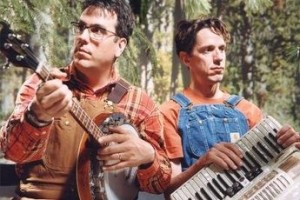 had long been one of the band’s calling cards. Birdhouse in Your Soul, for example, was about being a night-light, proud of its work (“So the room must listen to me filibuster vigilantly”) while admiring its distant relative the lighthouse (“Though I respect that a lot/ I’d be fired if that was my job/ after killing Jason off and countless screaming Argonauts”). But it was also about the poignant neediness of “Say I’m the only bee in your bonnet”, the kind wish “Make a little birdhouse in your soul”, and the self-contradictory nonsense “I’m your only friend/ I’m not your only friend/ but I’m your little glowing friend/ but really I’m not actually your friend/ but I am” — not to mention obscure rhyming similes like “My story’s infinite/ like a Longines Symphonette, it doesn’t rest”. From 1996 on, most of the songs have been about what they’re about, and nothing more. Just like almost every other band, sure, and the topics themselves have remained interesting; but it’s been disappointing.
had long been one of the band’s calling cards. Birdhouse in Your Soul, for example, was about being a night-light, proud of its work (“So the room must listen to me filibuster vigilantly”) while admiring its distant relative the lighthouse (“Though I respect that a lot/ I’d be fired if that was my job/ after killing Jason off and countless screaming Argonauts”). But it was also about the poignant neediness of “Say I’m the only bee in your bonnet”, the kind wish “Make a little birdhouse in your soul”, and the self-contradictory nonsense “I’m your only friend/ I’m not your only friend/ but I’m your little glowing friend/ but really I’m not actually your friend/ but I am” — not to mention obscure rhyming similes like “My story’s infinite/ like a Longines Symphonette, it doesn’t rest”. From 1996 on, most of the songs have been about what they’re about, and nothing more. Just like almost every other band, sure, and the topics themselves have remained interesting; but it’s been disappointing.
And each new album for grownups, I’ve liked a little less than before. Mink Car (2001) remains a triumph, and the most musically varied album they’ve ever made — it also includes their first love song, Another First Kiss, which is quite nice — but kept leaving gaps where punchlines belonged. The Spine and the Else (2004, 2007) would have struck me as impressive geek-pop debuts had they been by unknowns, tuneful and energetic, but they’re a bit monochrome, and for the first time miss my top tens for their years. Their new album Nanobots will be in my 2013 Top Fifty, but if it were all I knew of the band, I’d say “Well, glad I got to hear it”, buy a couple of its songs as MP3s, then passively ignore the rest of their career unless something impressive drew my attention back. They’ve also, in our young century, released four children’s albums that are fine if you like children’s albums (my kids never were drawn to those) — but of course those songs are even simpler, and with a few exceptions like Seven Days of the Week and Meet the Elements, I haven’t at my age found much in the way of keepers.
In the midst of which 2011’s Join Us was, to me, a recovery to greatness.
Anthems for losers? Can’t Keep Johnny Down, bubbly and organ-driven, is full of vainglory (“Men piled up in a towering mound/ none of them has once found a way to keep old Johnny down./ Spending days by myself, remembering slights/ I’m not a monument to justice, plus I don’t forget a face”), and filled with splendidly surplus details of petty resentment (“Some dude hitting golf balls on the moon/ bathroom in his pants, and he thinks he’s better than me”). The brassy oom-pah Cloisonne (titled for a decorative metalwork craft) is free-associative and may involve illegalities, but an artist complaining “While I’m deep in concentration, you start gettin’ all conversatin'” is going to be sympathetic to many, many TMBG fans. You Probably Get That a Lot is about the embarrassment of giving a well-meant compliment that the recipient gets over and over and over from everyone.
Their empathy again extends to where others wouldn’t think to go. Old Pine Box pities an escape artist whose Houdini/ Rasputin qualities have become a sad, antisocial, life-controlling compulsion. You Don’t Like Me is the detailed lament of a precognitive clairvoyant who antagonizes 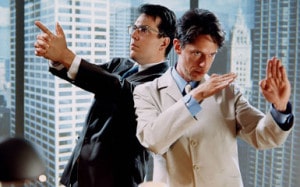 everyone by knowing their secrets and their future, and knows (because he can see the future) that he always, always will. The Lady and the Tiger follows an evening in the life of the “lady or the tiger?” title characters, waiting behind their doors for an adventurer to come by and choose a door, attempting to find purpose to their jobs and lives.
everyone by knowing their secrets and their future, and knows (because he can see the future) that he always, always will. The Lady and the Tiger follows an evening in the life of the “lady or the tiger?” title characters, waiting behind their doors for an adventurer to come by and choose a door, attempting to find purpose to their jobs and lives.
Random bursts of sing-along education? Aside from “cloisonne”, I also hadn’t known that Canajoharie was a Mohawk village, or that “cephalophores” are dead saints depicted in art carrying their own heads in their arms. Stylistic digressions? Mostly Join Us is in the vein of 1990’s endlessly hummable Flood, a little beefed up from having 150% more band members, but Spoiler Alert has some of the most complex interlocking vocals John & John have done; Celebration is unexpectedly smooth, ready for dances fancier than hopping up and down; 2082 is built on bongos and tuba blatts and Hawaiian-sounding keyboard; In Fact is built on a clever groove that suddenly turns into grand, sharp-left-turning progressive rock for twenty seconds, then ends. The Lady and the Tiger is bizarre hip-hop song with well-composed horn charts.
Signs of Linnell’s and Flansburgh’s adulthoods as family men? Never Knew Love is a sweet love song with lovely synthesizer and energetic drums, lines like “Cartography is not my metier” and “I go around thinking I’m a genius” important mostly as setting for the surprise of long-term contentment. Celebration is what the song title, and for that matter the album title, suggests.
If you’re new to They Might Be Giants, I’m not saying you *should* start with Join Us. Lincoln has more ramshackle, swerving, lo-fi charm; John Henry is, as mentioned, their best merger of whimsy with the dreaming aloud of outsiders looking in; Factory Showroom is, to me, their most brilliant approach to normalcy. But to me Join Us is, if harder to label, just as terrific. Every song shows a depth of creative effort, verbal as well as musical, that had been missing since the 1990s. Everything they’ve done well before, they do well here. I’d stopped expecting that; I don’t really expect it again now. But it happened.
– Brian Block
